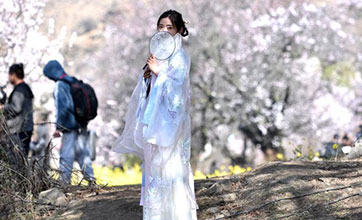Chinese consumers voice support for Xinjiang cotton to refute smears
BEIJING, March 30 (Xinhua) -- Chinese consumers are backing up Xinjiang-grown cotton and relevant products to refute the groundless "forced labor" accusations.
Claims made by some foreign brands including H&M and Nike that they refuse to use Xinjiang cotton due to the alleged "forced labor" in the region have triggered a strong backlash from the Chinese public.
"Xinjiang cotton is of great quality and I often buy clothes and quilts made of it. It's a loss for these brands to reject the material out of political reasons," said Wang Linlin, a shopper from east China's Nanjing.
China is the world's second-largest cotton producer, and Xinjiang Uygur Autonomous Region accounts for nearly 90 percent of the country's cotton output. Nearly 70 percent of Xinjiang's cotton fields use machinery to pick cotton during the harvest season, making large-scale manual cotton-picking a thing of the past.
"I think Chinese consumers are clear headed. They refuse to be fooled by some Westerners who chose to turn a blind eye," Wang added.
On China's Twitter-like Weibo, the hashtag "I support Xinjiang cotton" has received over 7 billion views as of Tuesday.
"We support Xinjiang cotton because the national interests are above everything," one Weibo user named "liaibaobei" commented.
More customers are sharing their experiences of buying Xinjiang cotton products online, frequently using words like "warm," "comfortable" and "durable" to describe clothes, quilts, towels and other items made from one of the world's best cotton fibers.
During a March 26 live-streaming session by Viya, a popular livestreamer, over 20 million yuan (about 3 million U.S. dollars) worth of Xinjiang cotton products were sold in just an hour.
Besides cotton, Chinese buyers also voice support for other Xinjiang products. Topics like "What is worth buying in Xinjiang" have attracted heated discussions on Weibo.
"Xinjiang fried rice-flour noodles are my favorite. It's super delicious and I buy it almost every week," one netizen wrote. Besides, Xinjiang tomatoes, yogurt and fruits have found mention as other preferences.
Weibo users have also been sharing interesting facts about Xinjiang cotton. Many people were amazed to learn from media reports that the paper used to make the Chinese banknotes contains 95 percent cotton.
"Don't want Xinjiang cotton? Stop earning money here," a Chinese social media user named "Biedaraowojinbu" said.
Speaking on the cotton boycott, Xu Guixiang, spokesperson with the government of Xinjiang Uygur Autonomous Region, said foreign enterprises should not politicize economic behavior.
The boycott of cotton and related products produced in Xinjiang by certain international trade bodies and foreign companies, based on groundless rumors, has seriously hurt the feelings of Chinese consumers and infringed upon the legitimate rights and interests of consumers, the Chinese Consumer Association said Thursday.
"These companies, operating in China, should strictly abide by Chinese laws and shoulder the responsibilities of protecting the rights and interests of consumers," the association added.
Photos
Related Stories
- Stories behind Xinjiang cotton cooperation ceased by BCI over forced labor rumors
- Western sanctions against China motivated by political interests in maintaining supremacy
- U.S. misleads public, diverts attention through human rights issues
- Commentary: BCI's cotton boycott against China is hasty and doomed to fail
- Chinese researchers build data set in southern Altai Mountains
Copyright © 2021 People's Daily Online. All Rights Reserved.










